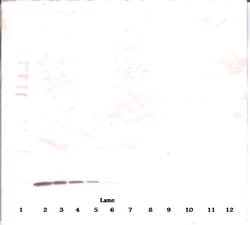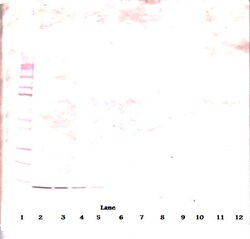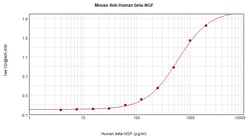Learn More
Invitrogen™ beta-NGF Monoclonal Antibody, PeproTech®
Mouse Monoclonal Antibody
Supplier: Invitrogen™ 500M85500UG

Description
AA Sequence of recombinant protein: SSSHPIFHRG EFSVCDSVSV WVGDKTTATD IKGKEVMVLG EVNINNSVFK QYFFETKCRD PNPVDSGCRG IDSKHWNSYC TTTHTFVKAL TMDGKQAAWR FIRIDTACVC VLSRKAVRRA. Preparation: Produced in mice immunized with highly pure Recombinant Human beta-NGF. Anti-Human beta-NGF-specific antibody was purified from cell culture by Protein G affinity chromatography. Sandwich ELISA: Assuming 100 μL/well, a concentration of 2.0-4.0 μg/mL of this antibody will detect at least 200 pg/mL of Recombinant Human beta-NGF when used with PeproTech Biotinylated Antigen Affinity Purified Anti-Human beta-NGF (500-P85BT) as the detection antibody at a concentration of approximately 0.5- 1.0 μg/mL. Western Blot: To detect Human beta-NGF by Western Blot analysis this antibody can be used at a concentration of 4.0-8.0 μg/mL. When used in conjunction with compatible secondary reagents the detection limit for Recombinant Human beta-NGF is 4.0-8.0 ng/lane, under reducing or non-reducing conditions.
Nerve growth factor (NGF) influences the survival and differentiation of a variety of neuronal and nonneuronal cells. The actions of this polypeptide result from binding to specific cell surface receptors which are present as both high and low affinity sites. Although both types of receptor bind NGF only the high affinity form is capable of signal transduction. Cross-linking studies with 125I-NGF have shown that the high affinity receptor of rat PC12 cells forms an Mr 158,000 complex with NGF while the low affinity receptor forms an Mr 100,000 complex. Full length cDNA clones for both the human and rat NGF receptor genes have been produced and sequenced, revealing greater than 90% homology between the two species. NGF exhibits nerve growth stimulating activity and is involved in the regulation of growth and the differentiation of sympathetic and certain sensory neurons. Further, NGF stimulates division and differentiation of sympathetic and embryonic sensory neurons. Mutations in the NGF gene have been associated with hereditary sensory and autonomic neuropathy, type 5 (HSAN5), and dysregulation of NGF gene expression is associated with allergic rhinitis.
Specifications
| beta-NGF | |
| Monoclonal | |
| PBS with no preservative | |
| P01138 | |
| NGF | |
| E.coli-derived Recombinant Human beta-NGF. | |
| 500 μg | |
| Primary | |
| Human | |
| Antibody |
| ELISA, Western Blot | |
| Unconjugated | |
| NGF | |
| B nerve growth factor; beta ngf; beta-nerve growth factor; BetaNGF; beta-NGF; bNGF; b-NGF; HSAN5; MGC161426; MGC161428; Nerve growth factor; nerve growth factor (beta polypeptide); nerve growth factor, beta; nerve growth factor, beta polypeptide; nerve growth factor, beta subunit; NGF; NGF b; NGF ß; Ngfb; NGFbeta; NGFß; ß nerve growth factor; ß NGF; ßNGF | |
| Mouse | |
| Protein G | |
| RUO | |
| 4803 | |
| -20°C | |
| Lyophilized |
The Fisher Scientific Encompass Program offers items which are not part of our distribution portfolio. These products typically do not have pictures or detailed descriptions. However, we are committed to improving your shopping experience. Please use the form below to provide feedback related to the content on this product.


